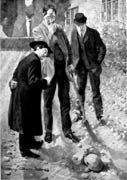What (BBC's) Father Brown Should Have Said
Commentary: Some values and limitations of the modern adaptions
The 2013-2022 BBC series Father Brown, based on G.K. Chesterton’s Father Brown detective stories, has proven extremely popular. The stories are not close adaptations of Chesterton’s stories, but are very loosely based on them. They are just close enough to still be entertaining to those who love Chesterton and the figure of Father Brown, but far enough to be disappointing. The disappointment primarily lies not in mere difference between the original text and the modern BBC version, but in the failure to correctly understand and portray Father Brown’s character. One particular moment illustrates that clearly, while showing the genius of Chesterton’s original Father Brown.
In a Season One episode, “The Eye of Kalon,” competition arrives in Father Brown’s neighborhood in the form of a new modern religion, a group of sun worshippers led by a charismatic man named Kalon. In Chesterton’s original, Kalon is a scoundrel, a fraud, and eventually, a murderer. In the BBC version, for much of the episode, he appears to be much the same, before we find, at the end, that he was merely disturbed by a traumatic experience in the war. That much is perhaps predictable, so predictable that it hardly disappoints. The modern desire to turn evil into misunderstanding or, in this case, illness, is hardly surprising.
But where the greatest disappointment comes from is that in Chesterton’s original, Father Brown was not a great detective only because he was so observant, but because, as a priest, he knew human nature keenly. In Chesterton’s original stories, one man, shocked that Fr. Brown was so insightful, gapes at him, “Are you a devil?”. “I am a man,” Father Brown replies, “and therefore have all devils in my heart.”
The gap between the BBC’s Father Brown and Chesterton’s struck me most notably in one brief comment near the climax. The BBC’s Father Brown has confronted Kalon, who has now proved to be more mentally troubled than a scoundrel. Kalon insists he has been visited by astral spirits who have imbued him with wisdom. In reply, Fr. Brown angrily retorts, “There are no astral spirits!” To which Kalon replies, “Says the man who believes in the virgin birth.”
Chesterton’s Father Brown never would have said that. He never would have denied the existence of astral spirits. This is something more like what Chesterton’s Father Brown would have said, and the BBC’s should have said if it was going to invent a speech for their version of Father Brown that was not in Chesterton’s original.
“If there are astral spirits, they are demonic spirits, for the sun was often the cruelest of the gods. Some peoples sacrificed hundreds of victims a day to satiate its thirst for blood. Don’t look to the gods of the sun, but rather to the Son of God. Look too long at the Sun and you will go blind or insane. Look at the Son of God and you will find not only virtue and goodness, but spiritual health and sanity. Seek not enlightenment from your astral demons, but from the True Light that enlightens every man, the Light of the World, which hath shone in the darkness and which the darkness hath not overcome. Look not to the mystery of the Sun, but to the true God, which was made flesh and dwelt among us.”
There are no substitutes for the original Father Brown.


